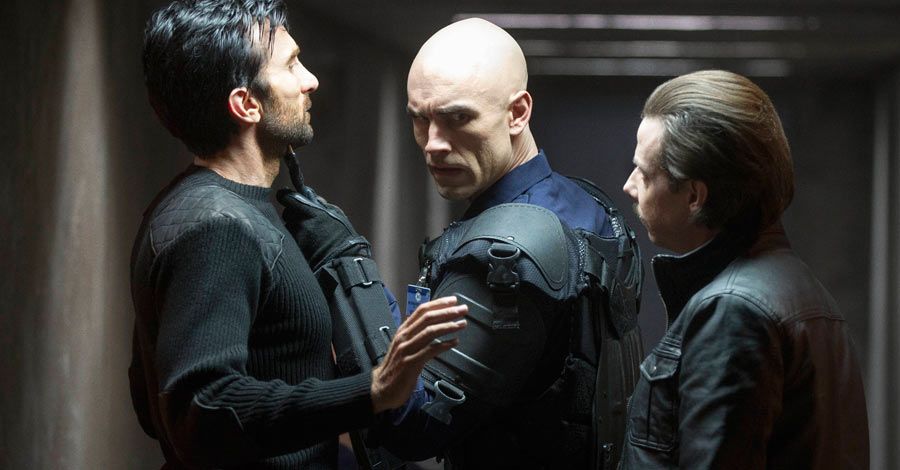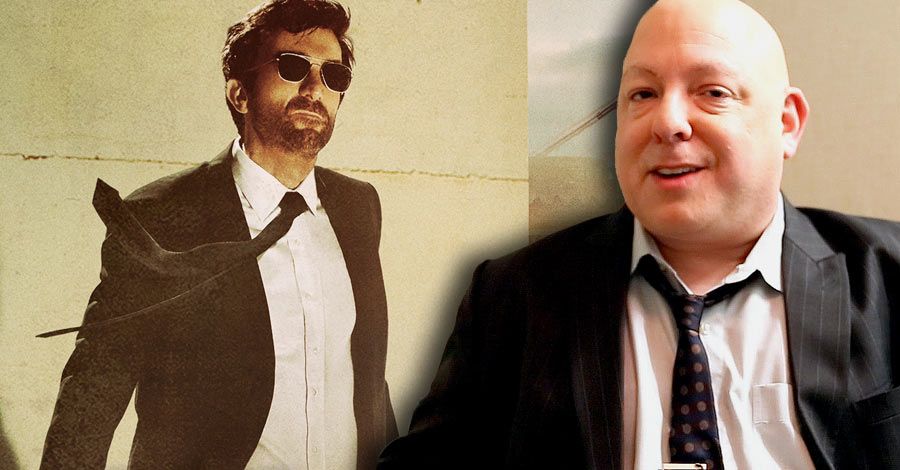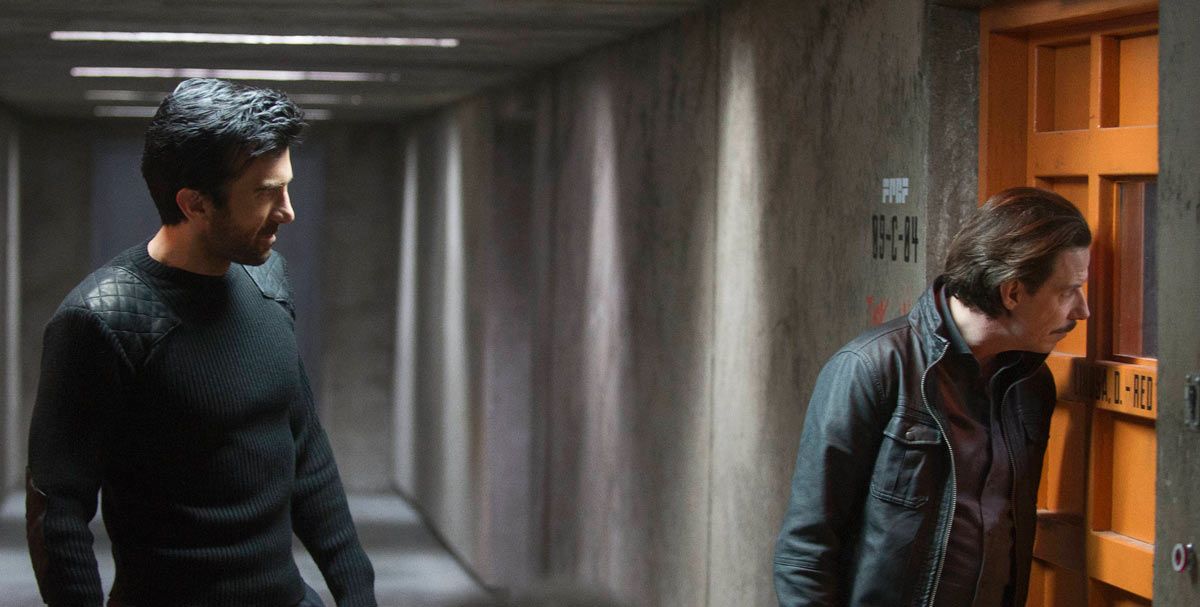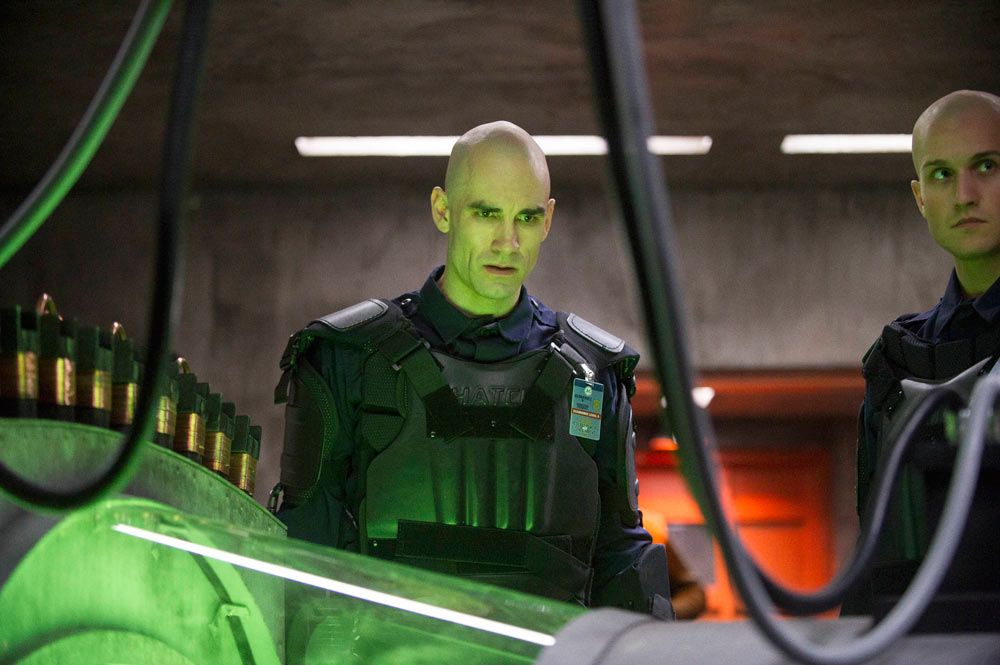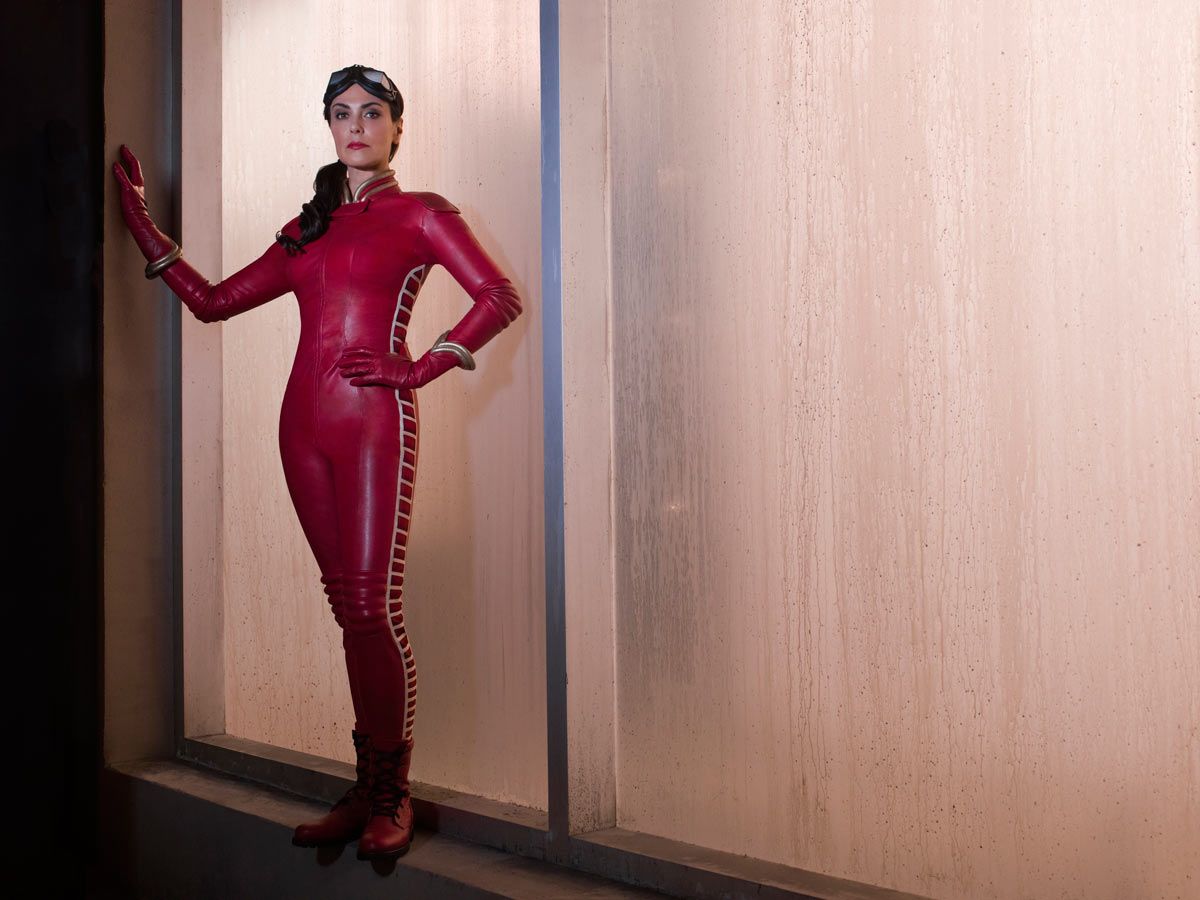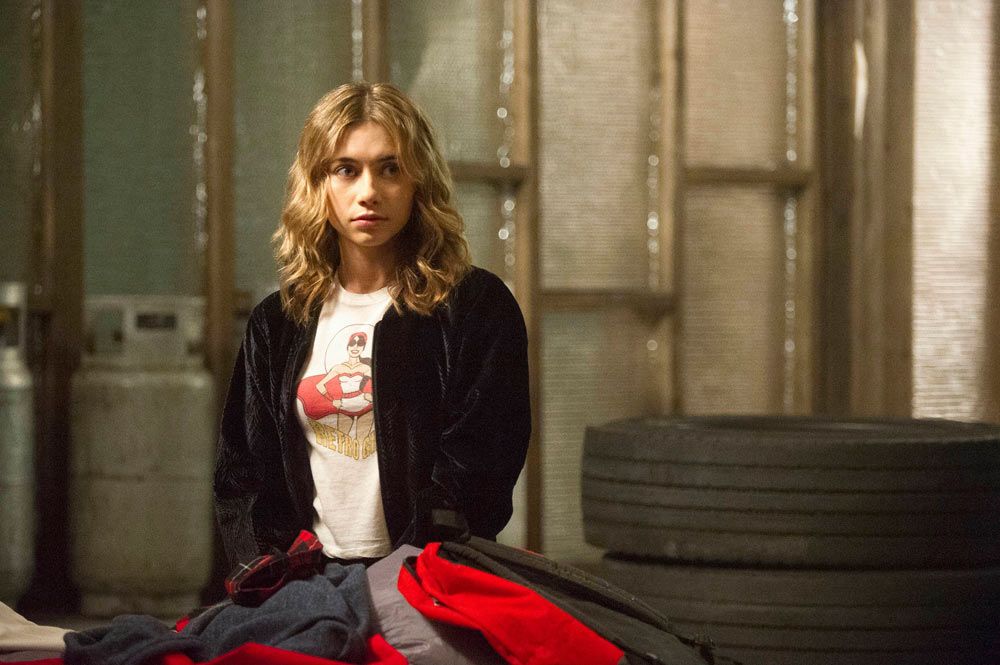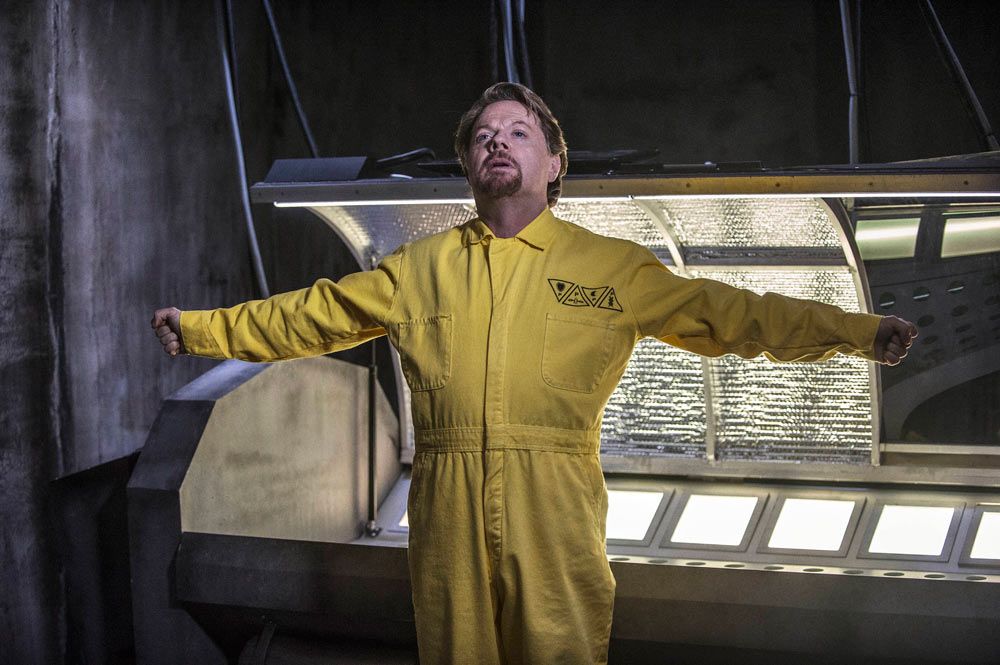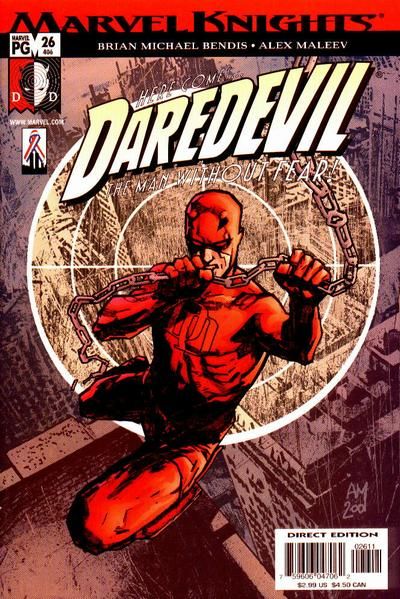Brian Michael Bendis has written a lot in his career -- plenty of comic books, sure, as the amount of issues he's able to produce a month has remained impressive over the last 15 years. Add to that his work in animation, film, video games and television, and by any measure, you have a prolific body of work -- and this week, his resume has grown even further.
Bendis is credited as the writer on this week's episode of the live-action "Powers" series, based on the long-running comic book he created with Michael Avon Oeming and released weekly on Sony's streaming service, PlayStation Network. As he explains it, TV writing is by nature a collaborative process, but this is the only episode of the show with his name on it. The episode -- the penultimate installment of the 10-episode first season -- is titled "Level 13," and features something of a heist, with Christian Walker (Sharlto Copley) and Johnny Royalle (Noah Taylor) both working to curb the threat of Wolfe (Eddie Izzard).
CBR News spoke in-depth with Bendis about his experience writing a "Powers" TV episode, the satisfaction in new creative endeavors, how he thinks the show has evolved and gotten better during the course of the first 10 episodes, the prospects for a second season, the amount he's tied his feelings of self-worth to what gets GIF-ed from the series, and the crucial importance of liberal f-word use in capturing a true "Powers" feel -- oh, and his thoughts on Netflix and Marvel Television's acclaimed "Daredevil" series.
CBR News: Brian, this week's episode of "Powers" is unique in a significant way -- it's the episode you wrote.
Brian Michael Bendis: Yes. And it's different than in comics, [where] every word is written by me. This, there's a writers' room, and we all put it together together. But yeah. My name on it!
This is an obvious question, but both for this episode and the series in general, what was it like writing on the show? After living for so many years with the comic book versions of the characters that you and Mike created, was it a pretty natural transition to switch into the TV versions, which are similar, but different -- different voices, different takes?
It was an experience I was looking forward to. There are creative experiences that I have all day that I've made for myself, but this is one that I said, "Ooh, this will be different! What will this be like?" It
just so happened that I was working on this and an issue of "Powers" at the same time. I was actually doing both in the same week, so that was equally peculiar.
One is all the voices that are in your head, and they've been there, and you know them pretty well. The other is you diving in head-first into the actor's energy, of which I had a good sense of -- every day we get the dailies, and every day we get cuts of the earlier episodes. You have a good sense of, "I bet this actor would love to do this. I saw them do this on the dailies, and I'm going to see if I can make that happen on the show." Much like in comics, you're writing towards your artist's strengths, you want to write towards your actors' strengths.
That was exciting. It became like two different universes that I'm writing in -- I felt like I was writing the Ultimate Universe and the Marvel Universe at the same time.
Well, you're used to that feeling!
Yeah! "I wonder what this feels like. Oh, it feels like writing 'New Avengers' and the Ultimates at the same time. OK, I've done that, I can do that."
Has this entire experience of working on the "Powers" TV affected the way you approach the comic at all, or is it still fairly distinct and separate for you?
I'm sure it does. We're so in it right now that it's hard to dive in. Also, the characters in the comic being on different tracks, and also being years ahead over where the show is -- I'll have to look back a year from now to see how that was. I sent Sharlto the new #1 and #2, just to show him how far down the character can go, and I got an all-caps email back: "WE HAVE TO DO THIS!" It's cool that things we're doing now may show up in the future -- Sharlto's version may show up, or Susan [Heyward]'s version. That's cool.
Also, having somebody as invested in Christian Walker as me and Mike have been alone in our rooms is very fascinating. It just is.
It's collaborative, as you said, you're not writing every word by yourself like in the comic, but how did this episode land as the one with your name on it? It's obviously an important episode, the penultimate episode of the first season.
A few things. Number one, when we got greenlit, I had commitments, in comics, in games, other projects. I could do the writers' room, but I couldn't physically write in the first half of the season. It actually benefited, because the second half of the season is so much better to me than the first half. Like all my favorite shows, it gets a little better, a little better and a little better. The production, the acting, everything just gets more refined as everyone finds their place in the world. I was in the room when we broke the last few episodes, knowing that I'll grab one of these. This one is about Walker and Royalle trying to figure out if they can trust each other, and if they can trust themselves. Walker's telling this story, and which version of it is true? He's telling the police one thing, he's telling Johnny one thing, he's telling himself another thing. Which one's going to end up being true?
In the room, I pitched a [teleportation] bit with Royalle [inspired by] my X-Men run with Magik, and Charlie loved it. So I said, "Well, I better write that episode, so at least people know I stole it from myself." [Laughs] I think you're allowed to rip yourself off. So all these stages, what it was about, the stuff with Michelle [Forbes] and Eddie -- Eddie gets to say a line of dialogue that I have been carrying around with me for like 10 years that I'm finally free of, because once Eddie says it, you're free of it. It's been said perfectly. It just had a bunch of stuff in it I was excited to do.
One of our Sony executives said this -- "I love that our penultimate episode is a fucking heist." It's a prison break-in. It's up to us to be weird, right? We should be the weird show. And we broke it down in a way where there's three different time periods going on at the same time. That is obviously a soft spot for me.
Piggybacking off of what you just said, a show like "Powers" must evolve a little differently than a broadcast show, since it was all filmed before the first episode aired, but it of course still evolves -- what did you like about the way the series developed and grew over these 10 episodes?
Here's the thing: Our first episode wasn't a traditional pilot. Most shows that you see, the first episode is almost a presentation for the network. "This is what we'd like you to make more of." But we were doing it as a series, so it was really the first chapter of 10 chapters -- there will be some elements that you have in a pilot, like setting up the world, and letting everybody know who everybody is, but it wasn't a traditional pilot.
In that world of television, there are two kinds of shows. There are shows like "Seinfeld," which immediately have a cool energy to them, but you watch those first episodes of "Seinfeld," and it doesn't even look like it's being filmed on a stage. It looks like someone's garage, and they're all talking very slowly. But yet, there's still something there. By the middle of the first season, they're off and running. They found it.
And then there's other shows where you see a tremendous pilot -- some big director came in and blew the roof up the place. What a piece of film. And then by episode three, you're like, "Uh oh. So you're not going to do that cool thing every week?" Between those choices, you'd want the one where the show gets a little better, a little better and a little better. And that happens for a few reasons. Number one, the actors are finding their characters, and some of the characters are more complex than others. It takes a few episodes to even reveal some of the layers. And then the actors find their own energy with each other, and you can see it in the dailies immediately. Who likes each other, who's going to fuck with each other, and you want to write into that. "I bet if you gave Susan a look right here, she'd kill it." Just based on what you've already seen. Or you say, "I bet this actor wants to go darker then they're being allowed to." Or there's just one little cut of something you see, and you realize, "Oh my god, they are so much funnier than they are being allowed to be." You just write into that stuff.
Some of the lighting got better, the sets looked a little bit [better] -- everyone behind the scenes is tinkering with stuff all the time. Then all of a sudden, you look at something like episode six where it all comes together, and it has the added bonus of having all the actors on stage at the same time for the first time. They're really a great ensemble. You're like, "Oh, thank god" -- because really, you want this show to be better at the end than it was in the beginning. But you don't know until you're doing it.
There have been several departures from the comic within the show -- some major, some minor. Obviously seeing Retro Girl alive and active is a huge difference. As co-creator of the comic, what were some of the changes you were especially pleased with, in the new they opportunities opened up for the show?
The thing that people are the most people responding to is Michelle and Retro Girl. Charlie had this great idea of her being an actress of a certain age, so we can dive into some of the stuff that ended up being very topical in our industry, about women in comics. We didn't know it at the time when it was being discussed in the writers' room last year.
It's funny -- I have completely wrapped my self-worth around what people GIF from the show. I didn't know that was going to happen. I was thinking, "I'd like to GIF some of this stuff and put it on Tumblr," then I looked -- "Oh, people are doing it! Yay! I don't know have to do it myself." But then you get fascinated about what they're GIF-ing. There's a lot of GIF-ing about Michelle -- the stuff she says about her costume, where she stands in the world, what she's sick of and what she's not. A lot of that was Michelle really digging into it on a personal level. That stuff was great. And that's stuff we never got to in the comics.
By episode four, Sharlto started a bringing swagger, for lack of a better word, or just an energy to Walker that I really, really was taking to. Some of it's very subtle, but it's very different from how we handle the character in the comic. It made me excited for where we could go with him.
It makes sense that the GIFs would mean a lot to you, because I don't know anyone who has as deft of a touch with GIF responses to Tumblr questions than you.
[Laughs] Well, thank you. It's hard to describe -- I'm online, I'm a pop culture professor, I know what's going on. But then when stuff happens to my stuff, I'm surprised. Even when the first episode of "Ultimate Spider-Man" was reviewed in Entertainment Weekly -- it never even occurred me that someone would review it. Well, what did I think was going to happen? It's a new show on a network. It's funny.
I find it immensely flattering when people take your work and chop it up like that, and express it in another form. I think Charlie didn't really know about them at all, so when he saw me posting them, I could tell he was like, "Oh -- OK." What's cool is that people found stuff that I think is the point of the show.
There's a lot of GIFs of Sharlto fucking with his ties, and I thought that was pretty hilarious.
Given that, are you pretty pleased with the response the show has gotten? It's something you're very close to and has been long in the works -- are you gratified with the reception so far?
The word of mouth is where we really find our audience. Also, people with PlayStations are very excited that they have something no one else does, even though tens of millions of people [have PlayStations]. [Laughs] People are being very proprietary about the show, which is quite flattering; like it's their show.
Also, Eddie has a giant fanbase, and Sharlto has a giant fanbase. Sharlto has a very strong following as a sex symbol, and there are many places on the Internet dedicated to it. We were the first thing that showed him with his shirt off, looking quite buff. A lot of that's come back at me on the Google Alerts! A lot of little corners of the world that I didn't know existed. I'm happy to give that back to the world. [Laughs] And Michelle has a fanbase. There's a lot of people coming to the show from different walks of life, and you add them all up and we hit the number that we're supposed to hit for the show, and everyone's happy with us. And that's good, because that was completely out of our control.
That all sounds quite positive, and I don't want to get ahead of the game, but since we're nearing the end of this first season, is there any indication yet on more?
We're hearing very positive things. As soon as that is official, I will not shut up about it. That I promise. But those who need to make those decisions are doing so right now -- even as we speak. Someone who works on the show has worked on other shows, and he pointed out that there's a point where no one speaks to you -- like you've died -- if the show's not doing well. But we can tell from the enthusiasm from PlayStation and Sony that they're very happy with the results that they got from us. We got them a show that's different from anything else that's on the air, and even the hardcore gamers are like, "Oh, cool, free show!"
And being first out of the gate isn't an easy position to be in.
The making of the show was not an experiment, but the platforming of the show is. You can do everything right, and it's not a place people are going to be looking for TV -- but people were watching a lot of TV on PlayStation. That's why PlayStation decided to do this. A great many people, a lot of comic book fans, have unplugged from cable. The transition to get people to watch the show has not been the effort that I thought it was going to be. I thought it was going to be a 24/7 uphill battle, and thanks to Netflix and Amazon and everybody else, it just isn't. Also, there are millions of people who are watching "Game of Thrones" and "Walking Dead" and whatever else they were watching [on PlayStation] -- it just showed that people like to go to the PlayStation Store and grab the latest episodes. We're happy we're right there in the front.
That was a concern in the beginning a lot of people had -- "How am I going to watch this, I don't have a PlayStation." Do you think the show's audience has mostly found it at this point?
Here's the thing: Starting next week, we'll have the whole season out. Some people flat out told me they're just waiting to binge. There are audiences that like the cliffhanger -- I like the cliffhanger, I was really happy about this -- but there are other people who just love to binge. Well, here comes the binge! I'm happy to be both things to both people.
This is a little off-topic, but while I have you here, as a former writer of the comic book for years and someone who's worked on a comic book-based show for a streaming service, how much "Daredevil" have you gotten to watch so far?
I absolutely love "Daredevil," and I'm immensely flattered -- I'm getting just about as much credit for "Daredevil" as I get for "Powers," and I have absolutely nothing to do with the show, other than Steve DeKnight and Joe [Quesada] are being so effusive in their niceness to me and Alex [Maleev]. Some of the show looks like Alex drew it. It's immensely impressive. I am four in -- I got four kids and four full-time jobs, so I didn't get to binge. I got to wrap up my "X-Men" run before "Secret Wars"! But I thought two and four were just inspiring. And anyone mentioning my name in the same context as this great show is insanely flattering.
And "Jessica Jones" coming up next! It's all cool, man. All this weird stuff coming to TV? I'm excited.
To bring up "Powers" again, my favorite response I'm getting is someone asking, "How much blood you think is in the human body?" Because there's a lot of anime-style blood flying out of people on "Powers."
And you haven't held back on the f-words in "Powers," which certainly makes it more authentic to the source material.
Hilariously, that's the thing that people were the most worried about. I told them: That's why it took us so long to get on the air! It really would not be the same without the f-bombs. There was nothing funnier than, my 70-year-old mother was over here, I showed her some of the show, Deena threw an f-bomb, and my mom winced like she got punched in the face. She's said this to me before: "I think this reflects badly on me as a parent." "Oh no, it reflects directly on you as a parent. You're wincing from a word that I learned from you!"
"Level 13," the Brian Michael Bendis-written ninth episode of "Powers," is available now on the PlayStation Network.

